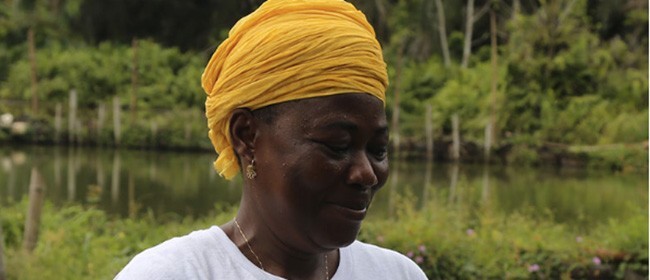Le complexe agro-piscicole Johan Estève de Zinvié-Zoumé dans la commune d’Abomey-Calavi, à une quarantaine de kilomètres de Cotonou, est une ferme polyvalente qui invente l’agriculture et la pisciculture de demain.
Sur un long domaine de quatre hectares incliné vers une mangrove, Eugénie Faïzoun, gérante du complexe, développe ses activités paysannes avec beaucoup d’enthousiasme. « J’ai ici un élevage de 3500 têtes de poules pondeuses, quelques têtes de moutons et de chèvres, des lapins, des canards, un hectare de banane plantain, et un petit périmètre maraîcher. J’ai aussi un autre domaine de trois hectares de palmier à huile et des parcelles pour des cultures saisonnières », confie-t-elle.
Mais à Zinvié-Zoumé, Eugénie Faïzoun doit surtout sa réputation à la pisciculture : 21 ans de métier ; un investissement de plus de 75 millions de francs CFA dans la construction de huit bassins de 24 mètres carrés, deux de neuf mètres carrés, un de 42 mètres carrés, l’installation d’une provenderie et d’une petite écloserie !
Ces deux dernières années, Eugénie a pu transformer en profondeur sa ferme grâce à une subvention à frais partagés de 14,6 millions de francs CFA (près de 24 000 dollars) du Projet d’appui à la diversification agricole -PADA financé par la Banque mondiale. « L’appui du PADA m’a permis de construire 5 bassins piscicoles pour produire des alevins de tilapia et de clarias, d’acheter un groupe électrogène de grande capacité, de réaliser un forage et d’acheter des géniteurs », précise-t-elle. La production d’alevins de tilapia est ainsi passée de 75 000 à 128 600 et celle d’alevins de clarias de 50 000 à 75 000. Du coup, son chiffre d’affaires a considérablement augmenté et Eugénie a réinvesti une grande partie de cet argent pour produire davantage de poisson.
Eugénie a également amélioré la qualité et la quantité de sa production en obtenant une souche d’élevage plus performante grâce à un autre projet financé par la Banque mondiale, le Programme de productivité agricole en Afrique de l’Ouest (PPAAO).
Tous ces travaux et innovations ont apporté une expertise unique au complexe agricole Johan Estève qui sert désormais de ferme école pour de nombreux pisciculteurs d’Abomey-Calavi et des communes environnantes. « J’ai déjà formé 227 personnes dans le cadre de projets financés par le Japon et par la Banque mondiale », indique-t-elle. Marcel Aklassato Kpatindé, pisciculteur à Pahou (commune de Ouidah) a été un de ses élèves, « Eugénie m’a formé à la technique d’insémination des alevins que je ne maîtrisais pas du tout. Je vous assure que cette dame est une référence dans notre profession. »
Eugénie a aussi noué un partenariat informel avec la Faculté des sciences agronomiques de l’Université d’Abomey-Calavi qui envoie régulièrement des volontaires en stage dans sa ferme. Tout comme le Lycée agricole Médji de Sékou dont les élèves viennent s’initier à la production animale.
Depuis quelques mois, Eugénie, qui préside par ailleurs l’Union régionale des coopératives de pisciculteurs de l’Atlantique, a engagé de nouveaux travaux d’extension de son unité de production. « J’ai commencé à déblayer les arbres de la rivière. Mon idée est de réaliser un lac artificiel et d’y installer des cages flottantes et des enclos », confie-t-elle. À moyen terme, elle projette d’exploiter deux hectares potentiels de surface d’eau pour un investissement d’environ 100 millions de francs CFA. Afin de pouvoir réaliser la première phase du projet, elle a sollicité un prêt de 20 millions de francs CFA en s’appuyant sur le Fonds de garantie mis en place par le PADA. Cet argent servira essentiellement à acheter 5 enclos (15 millions de francs CFA). En attendant la réponse à sa demande de prêt, elle a dégagé une portion de 2800 mètres carrés sur laquelle elle a installé un enclos et trois cages flottantes offertes par le PADA.
Eugénie aimerait également arrêter d’importer les aliments de prégrossissement d’alevins. « L’importation d’aliments me revient trop cher. Le kilo de provende importée pour le tilapia coûte entre 800 et 1000 francs CFA alors que ce que je fabrique de façon artisanale me revient à 350 francs CFA le kilo. Le problème, c’est que je ne peux pas fabriquer les aliments de prégrossissement sans une extrudeuse ». Or, pour l’instant il n’existe pas d’extrudeuse de production industrielle au Bénin. Pour en trouver, il faut aller au Ghana où une société étrangère produit de la provende qu’elle vend à plusieurs pays africains. Mais il en faut plus pour décourager Eugénie qui vient de découvrir qu’on peut acquérir des extrudeuses de petite taille au Bénin à environ 50 millions de francs CFA.
Le parcours d’Eugénie force l’admiration. Le prix de la meilleure piscicultrice que lui a décerné l’Agence japonaise de coopération internationale (JICA) en 2013, ne lui fait pas regretter d’avoir abandonné ses études de gestion comptable pour se consacrer à la pisciculture, sa passion. « Ce dont je suis surtout fière, c’est d’avoir réussi là où beaucoup d’hommes ont échoué », avoue-t-elle. Les revenus que lui procure sa ferme lui ont permis d’acquérir des biens immobiliers et d’offrir une bonne éducation à ses deux filles qui ont intégré des universités au Canada.
Source : banquemondiale.org


Leave a Reply